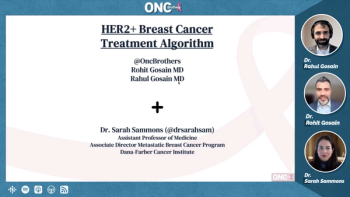
Data from Phase IIb AIPAC Trial of Eftilagimod Alpha Shows Promise
Immutep reported positive data from the randomized phase IIb AIPAC clinical trial of eftilagimod alpha and paclitaxel in HER2-negative, HR-positive metastatic breast cancer (MBC).
Positive data from the randomized phase IIb AIPAC clinical trial of eftilagimod alpha (efti, LAG-31g, or IMP321) and paclitaxel (Abraxane) in HER2-negative, HR-positive metastatic breast cancer (MBC) was announced by Immutep.
The multicenter, placebo-controlled, double-blind study is evaluating eftilagimod alpha in combination with paclitaxel in a cohort of 277 patients with MBC to try and boost the T-cell immune responses against tumors.
“I am pleased to see this innovative chemo-immunotherapy approach in AIPAC is well tolerated by patients, while showing a numerically (non-significant) higher progression-free survival rate compared to chemotherapy alone,” AIPAC principal investigator Hans Wildiers, of the University Hospitals Leuven in Belgium, said in a press release. “Hormone receptor positive breast tumors represent the majority of metastatic breast cancer patients and any active well tolerated adjunct to the weekly paclitaxel standard of care regimen is desirable. This combination warrants further investigation in larger and more biomarker selected populations.”
In AIPAC, patients were randomized 1:1 to receive either treatment A, paclitaxel chemotherapy plus placebo, or treatment B, paclitaxel chemotherapy plus eftilagimod alpha, for 6 months. Participants received weekly paclitaxel at days 1, 8, and 15 with either eftilagimod or placebo injected subcutaneously on days 2 and 16 of each 4-week cycle. Thereafter, patients will pass over to the maintenance phase with eftilagimod alpha alone.
The primary end point is to determine progression-free survival (PFS) and key secondary objectives include overall survival, safety, quality of life, and objective response rate (ORR).
Of the patients who received paclitaxel plus eftilagimod alpha, 63% were progression-free at the 6-month landmark according to RECIST 1.1 based on blinded independent central readers (BICR). Comparably, 54% of the patients who received paclitaxel plus placebo were progression-free at the 6-month landmark. The PFS data yielded an unadjusted hazard ratio (HR) of 0.93.
Moreover, the secondary endpoint of ORR saw an increase of 48.3% in the eftilagimod alpha group, from 38.4% in the placebo group. The combination therapy was also found to be overall safe and well tolerated.
Further, the researchers suggested that favorable results were demonstrated in multiple predefined patient subgroups, including:
- Patients with low monocytes count at baseline had a positive HR of 0.61 (median PFS of 5.45 vs 7.29 months), favoring eftilagimod alpha
- Patients with a more aggressive, more immunogenic luminal B type had a positive HR of 0.65 (median PFS of 5.45 vs 7.29 months), favoring eftilagimod alpha
- Patients with lower general performance status at baseline had a positive HR of 0.76 (median PFS of 6.67 vs 7.13 months), favoring eftilagimod alpha
“We are pleased to see a clinical benefit for patients receiving efti in HR-positive metastatic breast carcinoma in multiple patient subgroups. This is just 1 of the 4 advanced solid tumor indications targeted in our efti clinical development program,” Marc Voigt, CEO of Immutep, said in a press release. “We are pleased to see an efficacy trend and will carefully assess the data for further development of efti given our positive data in patient subgroups. More AIPAC results should become available in the coming months, including immune-monitoring data and overall survival (OS) data.”
These data, in combination with consideration of the OS and the immuno-monitoring data expected to be reported later this year, could lead to the development of a phase III clinical trial of eftilagimod alpha in metastatic breast carcinoma.
According to Voigt, another piece of evidence for eftilagimod alpha in patients with cancer comes from interim results seen in the ongoing phase II TACTI-002 trial. In TACTI-002, 47% of first-line patients with non-small cell lung cancer responded to combination treatment of eftilagimod alpha with pembrolizumab (Keytruda). These results are especially promising, given that only 20% of patients usually respond to pembrolizumab monotherapy in this trial indication.
Reference:
Immutep Reports Supportive Efficacy Data from the Phase IIb AIPAC Study; Overall Survival Data Expected in Late 2020 [news release]. Sydney, Australia. Published March 24, 2020. biospace.com/article/releases/immutep-reports-supportive-efficacy-data-from-the-phase-iib-aipac-study-overall-survival-data-expected-in-late-2020/. Accessed April 1, 2020.
Newsletter
Stay up to date on recent advances in the multidisciplinary approach to cancer.
































